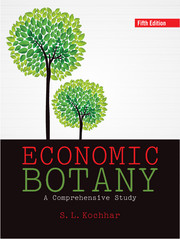Book contents
- Frontmatter
- Dedication
- Contents
- Foreword
- Preface
- Acknowledgements
- 1 Introduction
- 2 Fibres and Fibre Yielding Plants
- 3 Cereal Crops
- 4 Sugars, Starches and Cellulose Products
- 5 Legumes or Pulses
- 6 Vegetable Oils and Fats
- 7 Fruits and Nuts
- 8 Vegetables
- 9 Spices, Condiments and Other Flavourings
- 10 Fumitory and Masticatory Materials
- 11 Beverages
- 12 Wood and its Uses
- 13 Vegetable Tannins and Dyestuffs
- 14 Rubber
- 15 Medicinal Plants
- 16 Insecticides and Herbicides
- 17 Essential Oil Yielding Plants
- 18 Plant Diversity and its Conservation
- 19 Petrocrops: Our Future Fuels
- 20 Ethnobotany: An Integrated Approach
- References
- Index
19 - Petrocrops: Our Future Fuels
Published online by Cambridge University Press: 08 February 2018
- Frontmatter
- Dedication
- Contents
- Foreword
- Preface
- Acknowledgements
- 1 Introduction
- 2 Fibres and Fibre Yielding Plants
- 3 Cereal Crops
- 4 Sugars, Starches and Cellulose Products
- 5 Legumes or Pulses
- 6 Vegetable Oils and Fats
- 7 Fruits and Nuts
- 8 Vegetables
- 9 Spices, Condiments and Other Flavourings
- 10 Fumitory and Masticatory Materials
- 11 Beverages
- 12 Wood and its Uses
- 13 Vegetable Tannins and Dyestuffs
- 14 Rubber
- 15 Medicinal Plants
- 16 Insecticides and Herbicides
- 17 Essential Oil Yielding Plants
- 18 Plant Diversity and its Conservation
- 19 Petrocrops: Our Future Fuels
- 20 Ethnobotany: An Integrated Approach
- References
- Index
Summary
Fuel is one of the mankind's primary necessities, and it is indispensable, both in the home and industry. The use of wood as a fuel for heating and cooking dates from the earliest times. The more popular fossil fuels (principally coal, petroleum, etc.) and even the nuclear fuels (principally uranium, thorium, deuterium, and lithium) would be exhausted over a period of time because of over exploitation. Forests will ultimately remain our last reservoir. However, over the centuries, forest resources have been endangered in a number of ways as a result of man's unrestrained activities such as overgrazing, indiscriminate lumbering, agricultural operations and burning.
With the depletion of fossil fuel reserves on one side and their ever-increasing demand for our expanding industries and thirdly the threat of global warming through rising levels of greenhouse gas emissions, the world has seen in recent years a paradigm shift over handling the question of our energy needs.The search for viable alternative energy sources has become more urgent than ever before and the countries are turning back to nuclear energy, geothermal, solar power, wind and water power, etc. Another option available for us is to tap the potentials of ‘Energy Crops’ or ’Energy Plantation or plants producing hydrocarbons or utilisation of vegetable oils - both edible or non-edible - although renewable but would they be able to keep in check the carbon dioxide emission level!
Traditional or Conventional Energy Crops
As gasoline prices soar and the supplies dwindle, a shift from food production to fuel production (alcohol) has come to be encouraged in many affluent countries. Of all the energy crops, sugarcane (Saccharum officinarum L.) is known to give the highest alcohol yield per hectare. The combination of high alcohol yield coupled with the built-in source of fuel, in the form of bagasse, to operate the distillery, makes sugarcane exceedingly attractive candidate as an energy crop. The ‘energy canes’ developed in Puerto Rico and Cuba not only provide approximately the same amount of sugar per hectare as the standard cane, but also produce about three times more bagasse, making the whole industry self- supporting in energy.
- Type
- Chapter
- Information
- Economic BotanyA Comprehensive Study, pp. 627 - 643Publisher: Cambridge University PressPrint publication year: 2016



